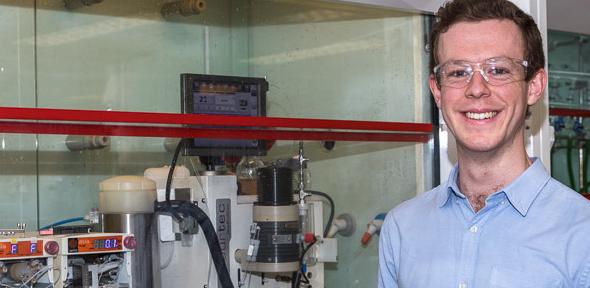
Daniel Fitzpatrick founded Cheminventory as a postgraduate student in the Ley group.
Early stage spin-outs
Accelerate Cambridge and Cambridge Enterprise
Accelerate Cambridge, which is part of the Judge Business School, offers 10-week programmes which combine entrepreneurship training, regular coaching and mentoring, and access to shared workspace. Accelerate has supported many budding entrepreneurs in the Department of Chemistry. We also benefit from the University's Cambridge Enterprise, which helps our innovators, experts and entrepreneurs use commercial avenues to develop their ideas and expertise for the benefit of society and the economy. CE supports entreprenurial endeavours in a variety of ways such as helping secure IP and licencing deals, assisting in patent applications, leading seed investment rounds and guiding companies through their early stages. Examples of spin-outs aided by these programmes include:
- SensorHut, which was founded by Tanya Hutter as a postdoctoral researcher, is commercialising a new chemical sensing technique based on the principles of optical absorption. SensorHut won third prize in the energy and environment category of the Royal Society of Chemistry's Emerging Technologies Competition (2016) and was highly commended in the Cleantech category of the Cambridge Independent’s Science and Technology Awards (2017).
- Healx Limited, co-founded in 2014 by former postdoctoral researcher Tim Guilliams with Professor Andreas Bender, received £8M in Series A funding (2018) to fight rare diseases, and was awarded Life Sciences Business of the Year at the Cambridge University Entrepreneurs Awards (2015) and AI Company of the Year at the Cambridge Independent Science & Technology Awards (2019).
- Kalium Health was co-founded by postdoc Tanya Hutter with a Professor in the Clinical School. It won the £25,000 Armourers & Brasiers Venture Prize (2019) to support the commercialisation of its research into developing a fast, accurate and low-cost home blood-testing kit to help kidney patients check that their potassium levels are not dangerously high or low.
- Cambridge Photon Technology, co-founded by Dr Hugo Bronstein with collaborators in Physics, is developing new materials to improve solar panel efficiency, and was one of eight winners of the Royal Society of Chemistry's Emerging Technologies Competition in 2019.
Postgraduate students
We now incorporate entrepreneurial training into our PhD courses – for example, 2nd year PhDs in our new SynTech CDT will receive training from Accelerate, and every term students are invited to join the Judge Business School EnterpriseTECH programme, which gives student teams real-world projects on which to hone their scientific, analytical and entrepreneurial skills. Noteworthy student accomplishments include:
- Dr Daniel Fitzpatrick, who developed ChemInventory as a PhD student in the Ley Group in 2014. It now has software licensed to 2500 institutions in 90 countries.
- Postgraduates Vivek Badiani and Constantin Sahm, who created eCO-SENSE with inventors Bombelli and Howe from the Department of Biochemistry as a result of an EnterpriseTECH project.
- Postgraduate student David Izuogu, who was part of the EnterpriseTECH STAR team awarded the Trinity Bradfield Prize in 2019, which promotes early-stage commercialisation of ideas.
- Former postgrad students Michael Chen and Gordon McInroy, who used knowledge and contacts gained from Accelerate to found biotech firm Nuclera, which closed a Series A round of venture capital financing in 2018.
Several academics with their postdocs or postgrad students have also submitted real-world projects for students in the Accelerate PhD+ programme to work on, which include:
- PepSmart (2018): A novel, smarter technology to develop orally administered peptide therapeutics in 2018, submitted by Professor David Spring working with postdocs Hannah Sore and Jessica Iegre.
- Intelligent toilet (2018): A low-cost point-of-care device utilising surface-enhanced Raman spectroscopy for quickly and simultaneously resolving physiological concentrations of a number of comprehensive biomarkers in urine, submitted by Professor Oren Scherman with Senior Technical Officer Elisabetta Spigone and the Department of Physics.
- A computational antibody discovery method (2019): Submitted by Professor Michele Vendruscolo with postdocs and Borysewiecz scholars Johnny Habchi and Pietro Sormanni, who work together in the Chemistry of Health building.

